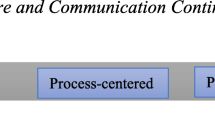Abstract
Actually guidelines require that patient must be informed about his condition so that he can choose the persons he wants to share these information with. Nonetheless, the caregiver usually gets an intermediary role in doctor–patient communication thus becoming the doctor’s main conversation partner and claiming to be given more information than the patient himself. A more complex situation is about brain tumours patients sometimes affected by cognitive deficiencies, compromising their comprehension skills or their capability of keeping the information they are being given. A preliminary study allowed to submit separately to brain tumour patients and their family members a semi-structured interview. Although doctors communicate diagnosis and therapeutic plans, patients and their family members often do not seem to remember the information they are given. An important percentage of patients and their carers cannot tell correctly what they was said by the doctors. Only a minor percentage of patients do not want to know all details of their disease. Instead, most of the family members, would rather their beloved were given just partial information on their conditions or even not given information at all. Communication with patients and their carers requires careful re-negotiation in a multiple time-points, rather than a one-off communication episode.
Similar content being viewed by others
References
Pitceathly C, Maguire P (2003) The psychological impact of cancer on patients’ partners and other key relatives: a review. Eur J Cancer 39(11):1517–1524
Garante per la protezione dei dati personali (2011) Dalla parte del paziente. privacy: Le domande più frequenti
Lobb EA, Halkett GK, Nowak AK (2010) Patient and caregiver perceptions of communication of prognosis in high grade glioma. J Neurooncol 104(1):315–322
McCarthy B (2010) Family members of patients with cancer: what they know, how they know and what they want to know. Eur J Oncol Nurs
Morris SM, Thomas C (2002) The need to know: informal carers and information. Eur J Cancer Care (Engl) 11(3):183–187
Royak-Schaler R, Gadalla S, Lemkau J, Ross D, Alexander C, Scott D (2006) Family perspectives on communication with healthcare providers during end-of-life cancer care. Oncol Nurs Forum 1 33(4):753–760
Dunn SM, Butow PN, Tattersall MH, Jones QJ, Sheldon JS, Taylor JJ, Sumich MD (1993) General information tapes inhibit recall of the cancer consultation. J Clin Oncol 11(11):2279–2285
Gattellari M, Butow PN, Tattersall MH, Dunn SM, MacLeod CA (1999) Misunderstanding in cancer patients: why shoot the messenger? Ann Oncol 10(1):39–46
Murtagh FE, Thorns A (2006) Evaluation and ethical review of a tool to explore patient preferences for information and involvement in decision making. J Med Ethics 32(6):311–315
Fallowfield LJ, Jenkins VA, Beveridge HA (2002) Truth may hurt but deceit hurts more: communication in palliative care. Palliat Med 16(4):297–303
Clayton JM, Hancock K, Parker S, Butow PN, Walder S, Carrick S, Currow D, Ghersi D, Glare P, Hagerty R, Olver IN, Tattersall MH (2008) Sustaining hope when communicating with terminally ill patients and their families: a systematic review. Psychooncology 17(7):641–659
Conflict of interest
The authors declare that there is no actual or potential conflict of interest in relation to this article. The authors are free of professional areas of conflict of interest such as: financial remuneration as employee, consultant or subcontractor with companies.
Author information
Authors and Affiliations
Corresponding author
Rights and permissions
About this article
Cite this article
Finocchiaro, C.Y., Botturi, A., Lamperti, E. et al. Privacy–solidarity conflict: the communication with the support group. Neurol Sci 32 (Suppl 2), 225–227 (2011). https://doi.org/10.1007/s10072-011-0792-0
Published:
Issue Date:
DOI: https://doi.org/10.1007/s10072-011-0792-0




